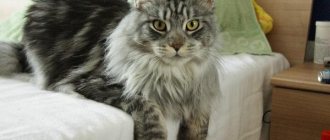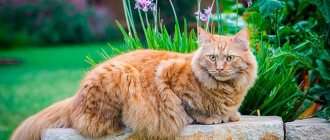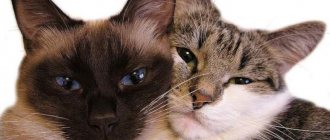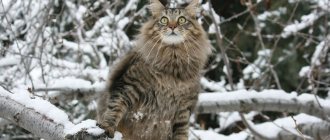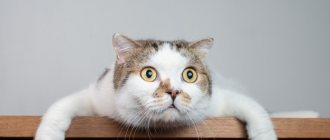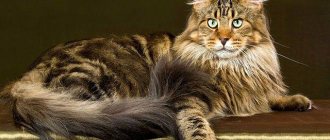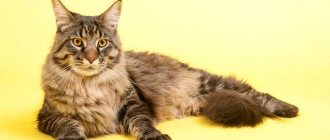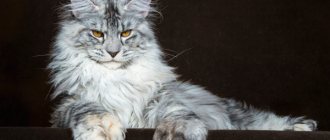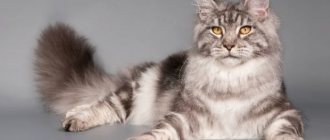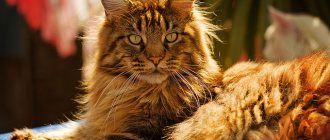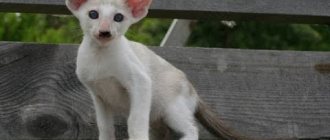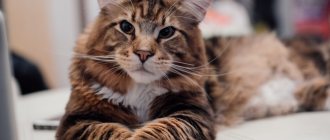The Maine Coon breed was formed in natural conditions, and breeders did not make any serious changes to it in order to improve the exterior. Therefore, its representatives are distinguished by fairly good health. But, like any other living beings, they can get sick. Therefore, you need to know what common Maine Coon diseases exist and how they manifest themselves.
- Breed problems
- Symptoms of diseases
- Breed Features
- Typical diseases
- Skin diseases
- Kidney and urinary tract diseases
- Cold
Maine Coon: problems of the breed
Representatives of this breed are very sensitive to the quality of food and water. If the diet is violated, for example by eating fatty, salty or spicy foods, they immediately begin to experience diarrhea. But it goes away on its own with normalization of nutrition. And long-term errors can lead to the formation of kidney stones. In such cases, urolithiasis is diagnosed.
Maine Coons often have dental problems. To avoid them, the animal must be accustomed from an early age to fairly solid food, in particular chopped, but not minced meat.
Unlike flat-faced cats, Maine Coons rarely have festering eyes, especially if the owner regularly removes physiological discharge from the eyes. Although sometimes a Maine Coon kitten's eyes water. This may be a sign of an allergy or irritation of the mucous membranes, such as tobacco smoke.
Also, problems of the Maine Coon breed are often associated with joints, since its representatives are large in size. Low physical activity leads to weakening of the muscles, causing them to become unable to protect the joints from damage. Therefore, increasing the activity of cats is the best prevention of arthrosis and other pathologies of the musculoskeletal system.
Diseases of the skin and coat
- The fur has lost its shine, becomes tangled or falls out. It is worth paying attention to your diet. With a lack of vitamins and minerals, a similar situation occurs very often. In addition, deterioration in the condition of the coat can be observed with frequent stress.
- Infectious diseases of the skin. Occurs in the presence of wounds and cuts. These include abscesses, folliculitis, boils, carbuncles, staphyloderma, streptoderma. Therefore, it is worth periodically examining your pet, especially if he is often outside, and if cuts and abrasions are detected, treat them immediately. If the infection begins to spread, the hair is removed from the affected area, after which the wound is disinfected. In severe cases, antibiotics are prescribed.
- Eczema. Maine Coon skin is affected by improper care (in some cases due to heredity). As the disease develops, the cat begins to scratch frequently, tearing the skin with its claws, and subsequently ulcers appear on the affected areas. The pet noticeably loses weight and becomes irritable. Treatment is prescribed by a veterinarian; antibacterial drugs are often used to eliminate the disease.
Symptoms of diseases
Maine Coons are strong and hardy animals that rarely get sick. The slightest deviation in their condition should prompt the owners to think about the need to contact a veterinarian.
His help may be required if the following symptoms are observed:
- discharge from the eyes;
- cough and sneezing;
- apathy and lethargy;
- dulling of fur;
- loss of appetite;
- diarrhea or constipation;
- temperature change;
- vomiting, etc.
Prevention and vaccination
The condition of the animal depends on how attentive the owner is to his pet. Maine Coons need to be vaccinated. The vaccine will protect against viral infections: calcivirosis, panleukopenia, rhinotracheitis and chlamydia. They are also vaccinated against rabies.
Even if the Maine Coon does not leave the apartment or go outside, it still needs to be vaccinated.
Infections can be brought on by people on clothes or shoes. To reduce the likelihood of injuries and diseases of the joints, you need to maintain an active lifestyle for your pet, but protect it from mechanical damage. Nutrition should be balanced, full of vitamin and mineral complexes. Prevention of hereditary diseases occurs, first of all, when the breeder takes a responsible approach to the issue of reproduction, learns about ancestors, and plans the crossing of healthy animals.
Breed Features
Genetic features cause an increased risk of having kittens with polydactyly. It is typical for her to have extra toes on her paws. This does not in any way affect the health of the animal or its activity, but interferes with its exhibition and breeding career.
Also, Maine Coons often suffer from heart disease. Hypertrophic cardiomyopathy is typical for the breed. It does not manifest itself in any way, but can cause the sudden death of the animal. Pathology can be diagnosed using ultrasound.
Hereditary diseases of Maine Coons include polycystic kidney disease. It is characterized by the appearance throughout the entire thickness of the renal parenchyma of small formations filled with liquid contents. But if in kittens the size of each of them does not exceed a few millimeters, then in adult animals they put pressure on the kidneys themselves and surrounding organs. And although symptoms of illness appear already when it has led to disruption of the functioning of organs, the disease must be diagnosed and treatment started as soon as possible. Otherwise, kidney failure develops, causing the death of the animal.
Show all products
Prevention measures
In order for the Maine Coon to please its owners for a long time and maintain excellent health, it is necessary to adhere to the following rules:
- provide your pet with a complete, balanced diet;
- provide the opportunity to perform active physical actions;
- carry out vaccination, deworming and treatment against ectoparasites in a timely manner;
- regularly conduct examinations with a veterinary specialist in order to identify hidden pathologies;
- identify genetic developmental abnormalities in kittens at an early age;
- Provide thorough coat care.
Maine Coons are a breed of cats with strong immunity. With good care, they can live for more than 15 years, remaining healthy and active. Therefore, owners need to have certain knowledge, be vigilant, and if their pets develop alarming symptoms of the disease, contact a veterinarian in a timely manner.
Feeding
The Maine Coon does not require a particularly special diet, but it is important to consider that it is a large and active animal. Nutrition should be complete and varied, including all the vitamins and microelements necessary for the animal. Experts do not give clear recommendations regarding whether to give dry or canned food to your pet.
As a rule, it is advised to feed mostly dry food, and offer canned food several times a week. All quality cat food manufacturers have special lines designed specifically to meet the needs of large cats. So they are suitable for Maine Coon.
In any case, homemade food is not suitable for Maine Coons, although some owners prefer to feed their pets this way.
You can give your cat natural food, but then you need to carefully select his diet. About three quarters should be various types of meat, and only a quarter should be milk and dairy products, seafood, eggs, and vegetables. With such a diet, it is important to give your pet vitamin and mineral supplements to its food.
Food specially produced for cats contains the substances necessary for the animal; high-quality dry food is an excellent prevention of tartar. Breeders recommend choosing dry food and canned food, the main component of which is some kind of meat.
For Maine Coons, food based on any grain crops is contraindicated, since genetically these cats are not predisposed to digest them. This is due to the fact that in natural conditions their ancestors never ate grain, and such feeding can cause various diseases in the pet, in particular diabetes or obesity.
It is not recommended to mix natural food and specially produced food, and you should not constantly change them or use several brands at once. It is better to accustom your pet to the diet of one manufacturer from childhood and not to use others unless absolutely necessary.
Dishes intended for the animal are important. It is best to purchase metal or glass bowls. This can be dishes made from any natural material, but not plastic.
Plastic feeders can cause allergies and other unpleasant ailments.
Requirements for biomaterial
A genetic test has been developed to diagnose SMA. The study can be carried out at any age. The test analyzes the mutation in DNA that leads to the development of the disease. The test result is a determination of the genotype, which allows dividing animals into three groups: healthy (homozygotes for a normal copy of the gene), carriers (heterozygotes, carrying one normal and one defective copy of the gene) and sick (homozygotes for the mutation, carrying two defective copies of the gene) . Carriers are healthy and do not show signs of SMA. Carrying out a DNA test will reduce the frequency of births of sick cats.
Specific diseases
Diseases in this breed are divided into two types: specific (extremely rare) and common. First, we will consider those diseases that a breeder or dog breeder encounters extremely rarely.
Specific ailments of Maine Coons include the following:
- hypertrophic cardiomyopathy. Hereditary heart disease leading to thickening of the walls of the ventricle. It is asymptomatic and leads to the sudden death of the animal;
- spinal muscular atrophy. It is also a hereditary disease that is caused by a recessive gene. A kitten can only be affected if both parents are carriers of this gene. The disease causes muscle weakness but does not cause sudden death. However, the animal cannot lead an active lifestyle. In this case, death occurs earlier;
- hip dysplasia. This is not a fatal pathology. But it provokes the development of pain syndrome, as well as joint dislocations;
- polydactyly. If there is such a deviation, cats will develop extra fingers. Coons with such a deviation cannot participate in exhibitions and belong to the breeding category. The violation does not harm the pet’s health and does not prevent it from leading an active lifestyle;
- Sometimes cats of this variety are allergic to any component of the food.
These are the main genetic abnormalities that are rare, but still found in representatives of this breed. If such a violation is detected, it is necessary to seek the opinion of specialists and follow their recommendations in order to minimize the risk of premature death of the pet.
And finally
There can be no definitive answer to the question of how many years your Maine Coon will live and whether he will always be healthy. On average, Maines live 12-15 years, but in some individual cases the age limit can increase to eighteen years or more. Of course, the Manx breed has hereditary risk factors (like almost all animals), but this risk will be significantly lower if you purchase a kitten from trusted breeders. And with proper maintenance and your tireless care, your pet will delight you for many years to come.
Cold
Maine Coons, whose bodies are weakened, are susceptible to viral respiratory diseases. Pathogens develop on the mucous membranes of the oropharynx and conjunctiva, often in the nasal cavity.
As a result, the affected areas become inflamed: the animal’s eyes become watery and mucous discharge flows from the nose. During this period, the cat stops washing itself, and traces of pus and mucus appear on its face.
Complications include:
- stomatitis, which manifests itself in the form of ulcers covering the oral mucosa;
- the mucous membrane itself acquires a gray tint and becomes sticky;
- further, the animal loses a lot of weight, vomiting and diarrhea develop.
Important! Respiratory diseases that have reached a severe stage are practically untreatable!
Colds occur in Maine Coons at any age, but newborn kittens, which have natural immunity, almost never suffer from respiratory viral diseases.
The disease is transmitted, as in humans, by airborne droplets, and therefore develops more often when animals are kept in groups. Sometimes a cat can simply be a carrier of a cold when the pathogens are dormant.
Viruses are activated under favorable conditions: stress, hypothermia, infection with other diseases that weaken the immune system.
Prevention, nutrition, healthy lifestyle
Preventive measures are carried out in the nursery and consist of the correct selection of producers, which helps to minimize the risk of developing the most severe genetic diseases. Particular attention is paid to the correct diet, in which the basis of the diet should be represented by meat or high-quality ready-made food . Maine Coons are regularly dewormed and vaccinated.
Proper care is no less important. The coat of a coon does not require special or too thorough care, but the animal must be periodically combed and bathed. It is imperative to monitor the cat’s ears, eyes and mouth, teaching your pet to all hygiene measures from a very early age. To maintain health, the Maine Coon must be provided with an active, active lifestyle with optimal physical activity, as well as stress prevention.
Maine Coons, despite their impressive appearance, are a very affectionate, playful and sociable breed, so you need to pay attention to the emotional state of your pet. A human-oriented animal needs not only full care, but also a friendly, attentive attitude . It should be noted that the health of coons, like any other pet, directly depends on the owner, so compliance with all the rules of maintenance and care will keep the popular semi-longhaired North American cat healthy and vigorous for many years.
Return to content
Cost of a kitten
A kitten of this breed is quite an expensive pleasure. Prices vary greatly depending on the purpose for which the pet is purchased: for exhibitions, breeding, or, as they say, “for the sofa.”
Kittens that meet the breed standard are usually purchased in order to be bred and shown at various competitions. The cost of such individuals starts from 100 thousand rubles, and this is far from the limit. The price is determined by the breeders themselves, and may vary depending on the region.
Kittens that have any deviations from the standards are cheaper, but also not cheap - about 60 thousand rubles. Such a cat will not be accepted for an exhibition and is not suitable for breeding, but this does not mean that he cannot become a wonderful friend, companion and favorite of the whole family.
Photo gallery of Maine Coons:
Preparing for the study
. Blood (2 ml) in a test tube with an anticoagulant. (sodium citrate, K3EDTA, K2EDTA), buccal epithelium 2. Copy of pedigree 3. The presence of a brand or chip WITHOUT IDENTIFICATION, WE ARE NOT RESPONSIBLE THAT THE SENT MATERIAL BELONGES TO THE ANIMAL SPECIFIED IN THE DIRECTION. IMPORTANT for taking buccal epithelium: Two hours before the procedure for taking biomaterial, the animal should not be fed; isolation from other animals is desirable. For puppies and kittens, breastfeeding should be avoided at least two hours before taking biomaterial. It is recommended to rinse the mouth with water (for convenience, you can use a syringe). IF YOU ARE ONLY DELIVERYING MATERIAL, PLEASE READ THE INSTRUCTIONS
